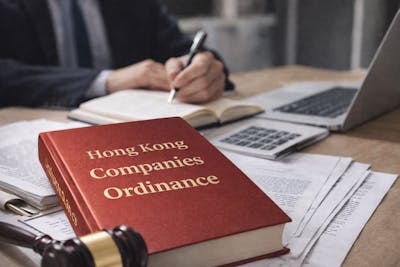The position of a director within a company is possibly one of the most vital administrative roles in the business. Company directors hold a position of trust and have fiduciary duties to the company and its shareholders. Their performance will have a direct effect on how efficiently the business is run.
What Is a Company Director?
A company director is an elected or appointed member of the board responsible for corporate structure, policy, and operations. Directors must be at least 18, not bankrupt, and can be from any country.
Every private company limited by shares must have at least one director, typically chosen by the owner and investors. Directors handle legal filings, manage finances, and ensure lawful operations. They can enter binding contracts with buyers, lenders, and suppliers, make decisions for the company's well-being, and act as trustees.
Comparison of Director Roles in Hong Kong Companies
| Company Director | Corporate Director | Executive Director | Non-Executive Director | Shareholder | |
|---|---|---|---|---|---|
| Definition | An individual appointed by shareholders to manage operations and finances. | A company or corporate body appointed as a director of another company. | A director with a full-time executive role within the company. | A director not involved in daily operations, providing external expertise. | Owns part or all of a company but is not necessarily involved in management. |
| Key Responsibilities | Oversees daily operations, ensures financial stability, and implements company policies. | Sets strategic direction, ensures legal compliance, and makes major decisions. | Manages business activities, implements strategy, and oversees departments. | Holds the executive team accountable, provides independent insights, and may serve on board committees. | Invests in the company and expects returns, appoints directors to oversee financial matters. |
| Involvement in Daily Operations | ✅ Yes | ❌ No | ✅ Yes | ❌ No | ❌ No |
| Decision-Making Authority | ✅ Yes, on operational and financial matters | ✅ Yes, at a high level | ✅ Yes, within company operations | ✅ Yes, as an advisor | ❌ No, but can influence decisions through voting rights |
| Can Be a Company or Individual? | ✅ An individual | ✅ A company or corporate body | ✅ An individual | ✅ An individual | ✅ An individual or entity |
| Appointed By | Shareholders | Board of directors or shareholders | Board of directors | Board of directors | N/A – owns shares |
Duties and Specific Roles of Company Directors
According to the Companies Act of 2006, these are a company director's specific roles and duties.
| Duty | Description |
|---|---|
| Follow and Comply with Company Policy | Adhere to policies affecting employees and shareholders. |
| Promote the Success of the Company | Act in the company's best interest, attend board meetings, and ensure long-term growth. |
| Consider Key Responsibilities | Decisions must account for long-term effects, employee interests, company reputation, and high business standards. |
| Ensure Accuracy and Timeliness of Financial Reporting | Oversee financial reports, maintain compliance, and facilitate audits. |
| Make Independent Judgments | Exercise decision-making authority without requiring owner or superior approval. |
| Exercise Skill, Care, and Diligence | Maintain professional standards similar to other employees. |
| Avoid Conflict of Interest | Prevent conflicts, even if they benefit the company. |
| Reject Benefits from Third Parties | Decline benefits unless they do not create conflicts of interest. |
| Declare Interests in Company Transactions | Disclose personal interests in transactions, proposals, or arrangements. |
Effective Corporate Governance in Hong Kong
A successful business needs good rules and leadership. A director must ensure the company is run properly and follows the right guidelines.
Running Board Meetings
To have good board meetings, start with a clear agenda and share important documents before the meeting. Make sure everyone feels comfortable speaking and sharing ideas. Write down important notes and follow up on tasks. Regular meetings help directors stay informed and involved so they can make smart decisions and guide the company in the right direction.
Financial Reporting and Disclosure
Keeping clear and accurate financial reports is very important for transparency. Directors must make sure the company tracks its finances properly, prepares the right reports, and shares important information with shareholders and regulators. Hiring experienced auditors and setting up good checks and balances helps keep everything correct. When directors manage finances well and share honest reports, they build trust and keep the company safe from problems.
Risk Management and Internal Controls
A big part of a director’s job is keeping the company safe from risks. This means finding possible problems, making rules to fix them, and checking often to make sure everything is working.
Having an audit team and doing regular checks helps keep the company strong and safe. Good risk management protects the company’s money and keeps its good reputation.
Eligibility to Become a Company Director
| Eligible to Be a Company Director | Not Eligible to Be a Company Director |
|---|---|
| An individual who is a shareholder or recent employee (e.g., a secretary) | An auditor |
| A corporate body | A banned employee or company director |
| A partnership | Anyone under the age of 16 |
| A group | Another limited company |
| An organization (business or charity) |
Appointing a Director
Choosing a director is usually laid out in the company’s Articles of Association. Here are some common ways to do it:
- Shareholder Resolution: Shareholders can vote to appoint a director during a general meeting. The Articles of Association detail the voting process and requirements.
- Board Decision: Sometimes, the existing board will appoint a new director to fill a gap or expand the team, following the guidelines set in the Articles.
- Written Resolution: For companies with fewer shareholders, directors can be appointed via a written resolution signed by all voting shareholders.
- Nomination Committee: Some companies have a nomination committee that scouts and recommends candidates based on their skills and the company’s strategic needs.
- Additional Requirements: The Articles might also include extra rules regarding qualifications, term lengths, and re-election procedures.
Register of Directors
A Hong Kong company is required to maintain an official register of directors at a designated location (S641(3)). This register must be compiled in either English or Chinese (S641(1)). For private companies, the register must include specific details for each director as stated in S643.
Individual Directors (Private Companies)
Each record should include the director’s current first and last name, along with any previous names or aliases. You also need to list both their residential and mailing addresses, plus their Hong Kong identity card number, or, if they don’t have one, their passport number and the country that issued it.
Corporate Directors (Private Companies)
The register must state the company’s name and provide the address of its registered or principal office.
Public Companies, Companies Limited by Guarantee, and Certain Private Companies
Every director’s entry should include their current name, any former names, both their residential and mailing addresses, and their Hong Kong identity card number (or their passport number and issuing country if they lack an HKID).
Private Companies With a Single Member Who Is Also a Director
The entry must contain the same details—current and previous names, both residential and mailing addresses, and the appropriate identification information.
Director Liabilities
In Hong Kong, directors have to follow strict rules set by the Companies (Winding Up and Miscellaneous Provisions) Ordinance (C(WUMP)O) and the Securities and Futures Ordinance (SFO). These laws mean that directors can get in trouble if they break the rules. They might have to pay fines or even face legal action if they make serious mistakes.
If a director lies in an important company document, they could be held legally accountable under the C(WUMP)O. Under the SFO, directors can also be punished for breaking market rules—this covers a range of activities such as insider trading (using secret company information to make money), false trading (making fake trades to trick people), price rigging (changing prices unfairly), leaking details about prohibited deals, manipulating the market, and sharing misleading information with the public.
Also, if a director doesn’t tell the truth about owning company shares, they could face criminal charges under the SFO. Any market misconduct offences under Part XIII and XIV of the SFO.
One interesting point is that, unlike in many other systems that follow English law, Hong Kong doesn’t hold directors or senior managers personally liable if a company keeps trading while losing money and can’t pay its debts.
Stepping Down and Dismissal
When a director decides to step down, the company is required to inform the Registrar of this decision in accordance with section 645(4). If the director thinks the company won’t report it, they must send the notice themselves to the Registrar to make sure it’s done properly.
The notification should clearly indicate the following details as prescribed by S464(4):
- Whether the resignation is dictated by the company’s articles or by an agreement requiring registration notification.
- If such a notification is mandated, confirmation that it has been properly provided.
If the company’s rules or a contract say that a director must officially report their resignation, then the resignation is not final until a written notice is sent. This notice can be delivered in different ways, such as:
- Leaving it at the company’s registered office,
- Sending it in a hard copy format, or
- Transmitting it electronically.
Removing a Director
If a director needs to be removed before their term is over, it can be done through a regular vote. Shareholders must agree in a meeting, and the director can attend and share their opinion. But if the director goes bankrupt or is mentally unable to do their job, they are removed immediately. Once the company confirms the director's removal, it has 15 days to notify the Companies Registry.
Interested in becoming a director yourself?
Register your business in Hong Kong with Air Corporate, and we'll help you dot the I's and cross the T's so you can become a company director in mere hours.






